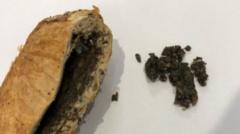Erin Patterson has been found guilty of murdering three relatives using toxic mushrooms disguised in a beef Wellington meal. The Supreme Court of Victoria has released photos and evidence from the trial, emphasizing the alleged premeditation involved in her actions.
Court Releases Evidence in Shocking Australian Mushroom Murder Case

Court Releases Evidence in Shocking Australian Mushroom Murder Case
Graphic evidence has surfaced in the high-profile trial against Erin Patterson, accused of poisoning her relatives with a deadly mushroom meal.
Graphic images showcasing toxic mushrooms and remnants of a deadly beef Wellington meal have been made public as part of Erin Patterson's murder trial in Australia. The 50-year-old was convicted of the murder of her three relatives, who succumbed to fatal poisoning after a family meal on July 29, 2023, in the small town of Morwell, Victoria. She has also been found guilty of attempting to murder a fourth family member who survived the ordeal.
The trial, which has captivated the country and sparked international interest, presented compelling evidence that suggested Patterson intentionally sought out highly poisonous death cap mushrooms before cooking the meal. Prosecutors argued that she tried to cover her tracks by discarding evidence and misinforming investigators.
The victims of the meal included Patterson's former in-laws, Don and Gail Patterson, both aged 70, as well as Gail’s sister, Heather Wilkinson, aged 66. Heather's husband, Pastor Ian Wilkinson, was hospitalized but ultimately recovered. Interestingly, Patterson's estranged husband, Simon Patterson, declined the invitation to the meal the day prior, citing discomfort due to existing tensions in their relationship.
In the wake of the jury's verdict, the Supreme Court of Victoria released over 100 images utilized during the trial. Among them were photographs of leftover beef Wellington collected from Patterson's home, which were sealed to prevent contamination prior to testing for the presence of death cap mushrooms.
The death cap mushrooms in question are notorious for their lethal toxicity, accounting for the majority of mushroom-related poisonings globally. They vary in appearance but typically range from greenish-yellow to brown.
Patterson contended that she had bought dried mushrooms from an Asian grocery store in Melbourne but could not provide specific details about the transaction, claiming it might have been cash with no receipt. However, investigators tracked her search history which revealed that she had accessed an online database documenting sightings of death cap mushrooms.
Her mobile data reportedly indicated she had traveled to areas where the mushrooms had been spotted prior to the meal. Additionally, forensic experts recovered images from her phone indicating she was weighing mushrooms, believed to be death caps.
The investigation intensified when traces of these poisonous mushrooms were discovered in a food dehydrator that Patterson allegedly disposed of at a local dump shortly after the meal. Though she denied owning the device, a manual was found in her kitchen.
Video evidence showed Patterson discarding the dehydrator, leading investigators to question her claims about the meal and her involvement. In the aftermath of feeling unwell, Patterson sought medical treatment two days following the meal, but her children tested negative for mushroom poisoning, despite her claims that they had consumed the leftovers.
This tragic case has sparked significant media attention and discussion surrounding food safety and the risks associated with foraging for wild mushrooms, underlining the potentially fatal consequences of misidentifying toxic varieties. As investigations continue, the community remains reeling from the implications of this crime and the lost lives involved.

















